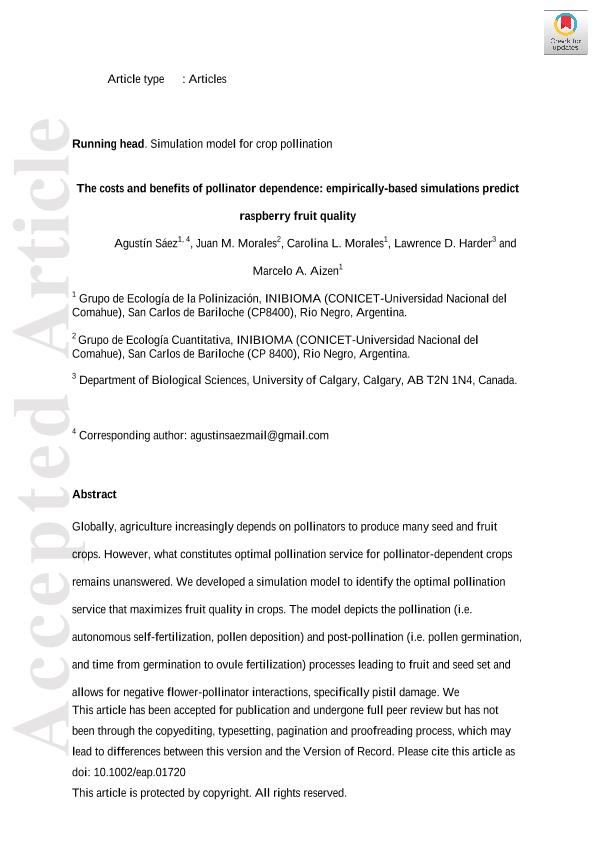Artículo
The costs and benefits of pollinator dependence: empirically based simulations predict raspberry fruit quality
Sáez, Agustín ; Morales, Juan Manuel
; Morales, Juan Manuel ; Morales, Carolina Laura
; Morales, Carolina Laura ; Harder, Lawrence D.; Aizen, Marcelo Adrian
; Harder, Lawrence D.; Aizen, Marcelo Adrian
 ; Morales, Juan Manuel
; Morales, Juan Manuel ; Morales, Carolina Laura
; Morales, Carolina Laura ; Harder, Lawrence D.; Aizen, Marcelo Adrian
; Harder, Lawrence D.; Aizen, Marcelo Adrian
Fecha de publicación:
24/07/2018
Editorial:
Ecological Society of America
Revista:
Ecological Applications
ISSN:
1939-5582
Idioma:
Inglés
Tipo de recurso:
Artículo publicado
Clasificación temática:
Resumen
Globally, agriculture increasingly depends on pollinators to produce many seed and fruit crops. However, what constitutes optimal pollination service for pollinator-dependent crops remains unanswered. We developed a simulation model to identify the optimal pollination service that maximizes fruit quality in crops. The model depicts the pollination (i.e., autonomous self-fertilization, pollen deposition) and post-pollination (i.e., pollen germination, and time from germination to ovule fertilization) processes leading to fruit and seed set and allows for negative flower–pollinator interactions, specifically pistil damage. We parameterized and validated the model based on empirical observations of commercial raspberry in western Argentina. To assess the effects of pollination intensity for fruit production, we conducted simulations over a range of visit number per flower by the two primary managed pollinators worldwide, Apis mellifera and Bombus terrestris. Simulations identified that ~15–35 visits per flower by A. mellifera or ~10–20 visits by B. terrestris provide adequate pollination and maximize raspberry fruit quality (i.e., estimated as the proportion of ovules that develop into drupelets). Visits in excess of these optima reduce simulated fruit quality, and flowers receiving >670 honey bee visits or >470 bumble bee visits would produce fruits of poorer quality than those receiving no bee visits. The simulations generated consistent, unbiased predictions of fruit quality for 12 raspberry fields. This model could be adapted easily to other animal-pollinated crops and used to guide efficient pollinator management in any agro-ecosystem.
Archivos asociados
Licencia
Identificadores
Colecciones
Articulos(INIBIOMA)
Articulos de INST. DE INVEST.EN BIODIVERSIDAD Y MEDIOAMBIENTE
Articulos de INST. DE INVEST.EN BIODIVERSIDAD Y MEDIOAMBIENTE
Citación
Sáez, Agustín; Morales, Juan Manuel; Morales, Carolina Laura; Harder, Lawrence D.; Aizen, Marcelo Adrian; The costs and benefits of pollinator dependence: empirically based simulations predict raspberry fruit quality; Ecological Society of America; Ecological Applications; 28; 5; 24-7-2018; 1215-1222
Compartir
Altmétricas



